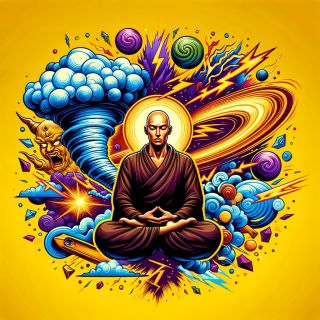Spirituality
The Spiritual Path to Nowhere
If you’re not getting anywhere, you’re finally getting somewhere!
Posted April 23, 2024 Reviewed by Tyler Woods
When The 99th Monkey was published, I pleaded with Barnes & Noble to create a new category in their stores next to “Self-Help,” to be called “No Help Whatsoever,” because I couldn’t bear to see my book lumped in with titles like How To Stop Being Depressed & Anxious in Seven Days After Being Utterly Miserable Your Whole Life, and The Raisin-Bran Cure for Everything That Ails You.
But let’s start with the basics.

Identifying the fundamental problem of spiritual life
There is no problem, and there is no spiritual path that will lead you to the solution.
End of story.
And that, my friends, can be a huge problem for people.
Consider the countless titles currently available on Amazon that assert this basic truth:
Be Here Now, The Power of Now, Awakening to Infinite Presence, Nowhere to Go, Life Starts Now, Do Nothing, Embrace the Present, This is It, You Are Already There, In This Very Moment, As It Is, Just This.
Despite all these utterly annoying reminders, most of us have nevertheless persisted on a spiritual path as if none of the above admonitions were true. We think all of those titles are a trick as we merrily continue on our treadmill of seeking the Holy Grail. We absolutely believe, in the deepest core of our beings, that up ahead somewhere (but not here), and in the future at some point (but not now), there will be a final, glorious place of arrival, a spiritual version of “happily-ever-after.”
The late Zen teacher Thich Nhat Hanh tried to disabuse his students of this flawed perception by asking them to recite, whenever they were walking, “With this step, I have arrived.” With that simple assertion, years of searching for what is yet to arrive someday in the future comes grinding to a halt. Ram Dass wasn't being glib when he wrote Be Here Now, the spiritual Bible of a generation. "Here" is always where the spiritual action is. God (or "True Nature" if you prefer) is neither residing in the sky nor in a hidden Himalayan cave. Rather, as Persian mystic and poet Kabir wrote, "God is the breath inside the breath." It's no accident that the vast majority of meditation practices across traditions use focusing on the breath as the means for bringing one's wandering mind back to the present moment.
Nevertheless, we fervently persist in the illusion that there is some elusive magical experience that will at last put an end to our Great Search: decades of meditating, praying, chanting, silent retreats, vision quests, plant medicine ceremonies, ashrams, monasteries, Tibetan lamas, Buddhist or Christian monks, South American shamans, endless workshops, intensives, and seminars, book after book after book. Ironically, as I pointed out, most of those books implore us to stop searching and take notice of the Vast Mystery of This, in which we always already reside, even as we persist in searching for the Promised Land.
Welcome to the Promised Land
Even if we were to accidentally stumble into a temporary approximation of such a place of peace and illumination, a sense of finally arriving at the goal of our lifelong quest, like every other experience in temporal life, it wouldn't last, and we’d spend the rest of our days desperately trying to get back to that fleeting state and not let it slip away this time, while failing to notice that in doing so, we are, in fact, letting our lives slip away.
I’m reminded of sitting for hours and hours a day in meditation at a Zen retreat. On the morning of Day 4, the teacher said, “Well, this is our fourth day together, so you’re probably wondering when something is going to happen. Nothing is going to happen.”
The Zen joke of it was that he meant it. For real.
Werner Erhard, an early teacher of mine, used to proclaim, “All suffering is a result of the false notion that "This isn't it.” We just know there’s something much better out there if we were only to do the right things, meet the perfect teacher, find the correct practice—or mate, or diet, or profession. If we could only hustle our way to that perfect alignment of circumstances we believe would make us happy. But we are looking for love (and enlightenment) in all the wrong places.
For the resolution of all suffering is to fully embrace—actually to choose—exactly "what is" in this very moment of our personal and collective existence, rather than rail against it. In other words, This Is It. We each have the ability to wave the white flag of surrender in our ongoing battle with "Reality As it Is" (one of my favorite names for God.) We can declare with power and authority, "Let there be this!" and voilá, so it is. The oft-quoted idea of "creating our own reality" has been greatly misunderstood. Our innate spiritual power is not to "get what we want." Rather, it is the exact reverse: to want what we get. Master that skill, and there can never come a moment when life isn't a precise match with our desires.
"This is it" is usually not good news for most of us because we all have a very long list of complaints about how it is. But no matter how horrible the circumstances of life may appear, spiritual freedom is never dependent on those situations changing or improving in the slightest. Rather, spiritual awakening is to cultivate the sublime ability to “be with what is” in every moment.
To illustrate, a student once travelled half-way across the globe to ask famed spiritual teacher, Jiddu Krishnamurti, a single question: “How are you able to remain so calm and unperturbed in this miserable chaotic world?” to which Krishnamurti quietly responded,
“I don’t mind what happens.”
Do you?




